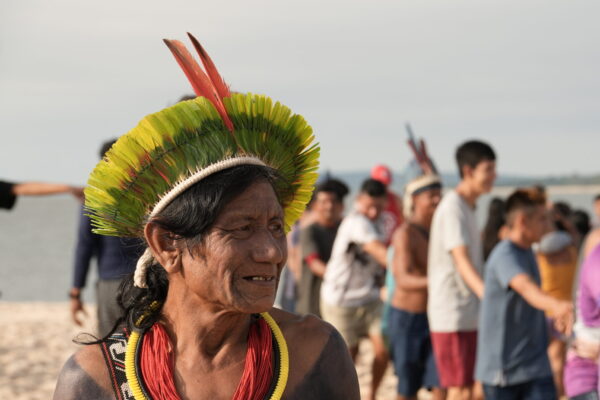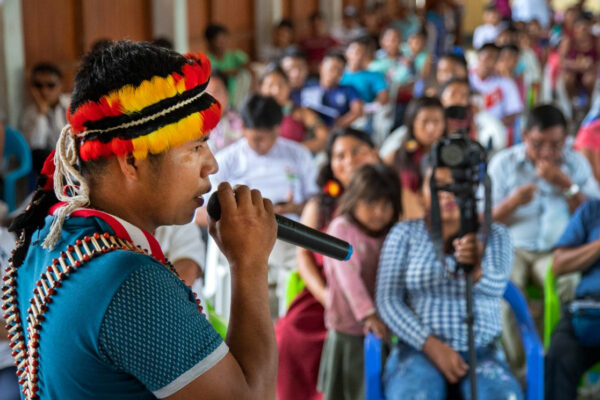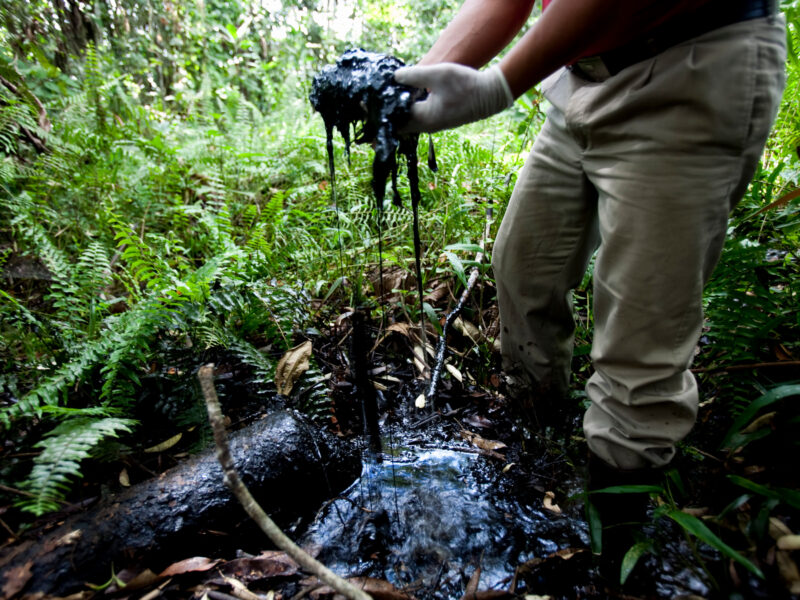The murders of George Floyd and Breonna Taylor have catalyzed a seismic and long-overdue shift in support for the Movement for Black Lives and to defund the police. At the same time, the climate justice movement has finally begun to gain momentum because of the increasing recognition that overcoming our environmental crisis requires addressing and confronting racism. The case of Chevron’s criminal mistreatment of Indigenous and rural peoples in Ecuador’s Amazon provides a perfect example of the degree of systemic racism that we must dismantle to be able to hold corporate polluters fully accountable for their illegal and unethical actions.
The overt racism exhibited by Chevron towards Amazon communities in Ecuador helps explain why it has yet to clean up the 16 billion gallons of toxic waste it deliberately dumped into the northern Ecuadorian Amazon between 1964 and 1990, home to over 30,000 Indigenous and rural Ecuadorians. But the corporate criminals at Chevron are not the sole culprits. As with the institutionalized system of racism in the U.S., there is complicity within the courts, law enforcement, and in this case even the media.
The ultimate expression of this systemic racism towards the people of Ecuador is the fact that Chevron – even after admitting its environmental crimes in the Amazon – continues to ignore the Ecuadorian court ruling against the company. Our justice system was built this way. This is not the first or last time a corporate polluter will escape justice because of the political and legal influence and loyalty they have been able to buy. This judgment found Chevron had deliberately dumped billions of gallons of toxic waste into the rainforest, devastating Indigenous communities and killing scores of people from cancers and other oil-related diseases. It has been upheld on appeal by four layers of Ecuadorian courts, including its constitutional court. Chevron has vowed never to pay the judgment even though it fought to have the case tried in Ecuador and had accepted jurisdiction there.
After forum shopping for a few years, Chevron also struck an alliance with pro-business U.S. federal judge Lewis A. Kaplan (formerly a tobacco industry lawyer), who referred to the Ecuadorians as the “so-called plaintiffs” and permitted Chevron to launch a retaliatory lawsuit back in the United States to try to undermine the Ecuador judgment. Kaplan ruled with no jury or evidentiary hearing that no court in the entire world could enforce the judgment. Although that decision was overturned, he later permitted Chevron to pay an estimated $2 million to its already admittedly corrupt key witness Alberto Guerra, during the trial. Chevron’s lawyers at the Gibson Dunn firm coached this witness for 53 days before he testified. Guerra later admitted he lied on the stand, yet Kaplan continues to use his testimony to claim the judgment was obtained by fraud.
Stop polluting Richmond communities and delete your account.
— Greenpeace USA (@greenpeaceusa) June 5, 2020
Corporations, and fossil fuel companies in particular, regularly externalize their costs onto the backs of communities of color in the United States and around the world. If governments challenge that power, international institutions are used to prop-up the corporations and further violate the rights of the people. Chevron abused a bilateral trade agreement between the U.S. and Ecuador to attempt to force Ecuador’s government to cover the entire cost of its mass industrial poisoning it caused is just one example.
It is also a chilling example of how corporations can violate due process by threatening economic devastation against countries in the Global South. Chevron brought a complaint before a tribunal of paid arbiters who excluded the communities in Ecuador from even appearing. They ultimately ruled that the government of Ecuador didn’t sufficiently protect Chevron from its own victims who are seeking a clean-up and financial aid for health care in the wake of the ongoing health crisis. This is a textbook example of institutionalized racism.
Ask yourself this: would Chevron be able to deliberately dump oil waste directly into an affluent white community for decades and then leave the area without EVER cleaning it up? If those people then sued and – against all odds – WON, would a U.S. federal judge allow Chevron to not pay and even counter sue them based on false evidence and bribed witnesses? Not in a million years, because they have the money, systems, and institutions on their side.
And it’s not just Ecuador. Polluting communities of color and refusing to take responsibility for it is a key part of the Chevron business model. You can see evidence of this in just about every community or country in which Chevron operates. Last month, communities affected by Chevron organized events for the annual Anti-Chevron Day. Messages came in from communities in Ecuador, Richmond, CA, Nigeria, and Australia. Just a week prior to Chevron’s annual shareholder’s meeting, activists, community organizers, and Indigenous leaders directly harmed by Chevron denounced the company’s actions and called for international support to hold it accountable.
William Lucitante, President of UDAPT, said, “Chevron obtains economic resources while sacrificing our lives. There are many people who suffer from cancer and have died. Our rivers are polluted. The right to food that we have as Indigenous peoples is also affected by the pollution… Chevron is guilty and must pay the damages in order to repair the Ecuadorian Amazon.”
You don’t care about the black lives in… Richmond, CA and Nigeria where your operations & flaring KILL people & when they fight back you SUE THEM! Oh, and #Indigenouslives in Ecuador where you poison & refuse to cleanup. #ChevronMenace #climatejutice pic.twitter.com/6qodqEffVh
— Amazon Watch (@amazonwatch) June 5, 2020
If Chevron thought the coronavirus lockdown would shield it from criticism during its annual meeting, it was sorely mistaken. Chevron CEO Michael Wirth, as well as senior management and the company’s Board of Directors, faced a barrage of shareholder resolutions criticizing the company’s poor human rights and environmental record and the enormous amount of funds it has spent to lobby against climate change action.
Chevron was forced to play audio messages from Nobel Peace Prize winner Jody Williams and world-renowned actor and producer Alec Baldwin for all its executives and shareholders at the meeting. “The tide of public opinion is turning,” said Baldwin, who accused Wirth of not protecting shareholder value by ignoring its Ecuador liability. Wirth responded to Baldwin by saying his comments were “offensive” before proceeding to read a long list of scripted lies in a futile attempt to refute Baldwin’s accusation that Chevron has become the “Harvey Weinstein of petroleum companies.”
On January 4, 1999, plaintiffs claim that Chevron-leased
helicopters carrying Chevron representatives flew over the Nigerian villages of Opia and Ikenyan and opened fire. Nigerian soldiers in Chevron-leased boats followed the helicopters in, attacking the villages. https://t.co/wyCt3fSiDe— Antonia Juhasz (@AntoniaJuhasz) June 6, 2020
Nobel peace prize winner Jody Williams, on behalf of 28 other Nobel laureates from around the world who signed a statement of support for the Ecuadorian communities, confronted the company about the “Chevron Way.” Williams called Chevron out for its actual practices of “using corporate money to retaliate and intimidate” its critics, including New York attorney Steven Donziger whom the company has demonized for years in what is considered the world’s most well-financed corporate retaliation campaign.
Another message was submitted by legendary rock star Roger Waters (who visited Chevron’s devastation in the Amazon in 2018), but Chevron censored the message for its shareholders by refusing to play it.
The flagrant corruption in the U.S. judiciary in support of Chevron’s efforts is frankly staggering. Even though several years ago Chevron won its retaliatory lawsuit against Steven Donziger, the lead US lawyer for the Ecuadorians (meaning he can’t profit in the U.S. from the judgement and preventing enforcement in the U.S. only), it hasn’t stopped trying to destroy his life. The simple explanation is that Chevron doesn’t want Donziger working to enforce the Ecuadorian verdict outside the U.S., nor does it want anyone to work with him in solidarity with the Ecuadorians. Donziger is now in his 11th month of house arrest for refusing to surrender his computer, cell phone, and email passwords to the same judge – Kaplan – who permitted Chevron’s bribed witness to testify.
Here’s a list of outrageous and unprecedented miscarriages of justice all within the last few months:
- Judge Kaplan hired a private corporate firm to file criminal contempt charges against Donziger (in a civil case)
- Kaplan picked his friend judge Preska to oversee the contempt case, who insists Donziger is “flight risk” despite his passport already being seized and two decades of work on the case from New York
- In a massive breach of ethics, Seward and Kissel, the law firm Kaplan hired after the Federal Prosecutor refused to take the case – twice, failed to disclose that it had Chevron as a client, yet Preska refuses to disqualify them.
- Donziger is thought to be the ONLY U.S. lawyer EVER to be held on pre-trial detention for a contempt charge.
- Donziger has already served TWICE the maximum sentence for the charges brought against him.
These things are happening in full view of the news media, yet there’s little to no mainstream coverage. And you won’t find a New York Times article following up on its prior coverage of Kaplan explaining that after reviewing the case and Kaplan’s decision, the New York Bar recently recommended that Donziger’s law license be immediately reinstated.
International human rights watchdogs like Global Witness have already raised the alarm about the corrupt acts of Kaplan, Chevron, and their lawyers at Gibson Dunn. Yet how can we expect environmental justice until the global community stands together and demands accountability for the worst oil-related crime in history – committed deliberately by a U.S. company, admitted to, and still poisoning people 50 years after it began?
The fossil fuel industry will never be held to account until its worst offender is brought to justice.












